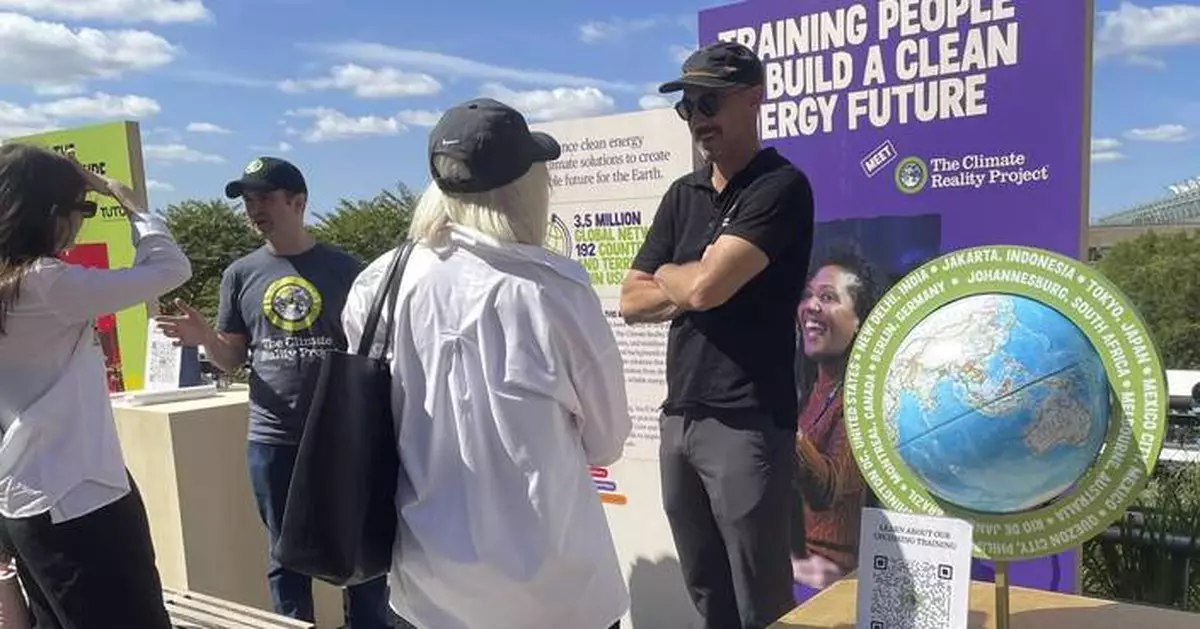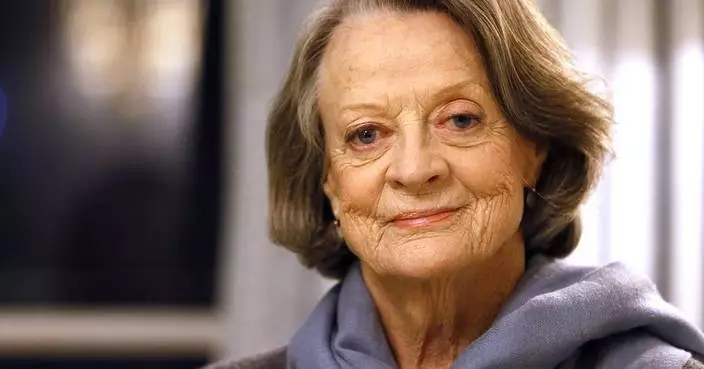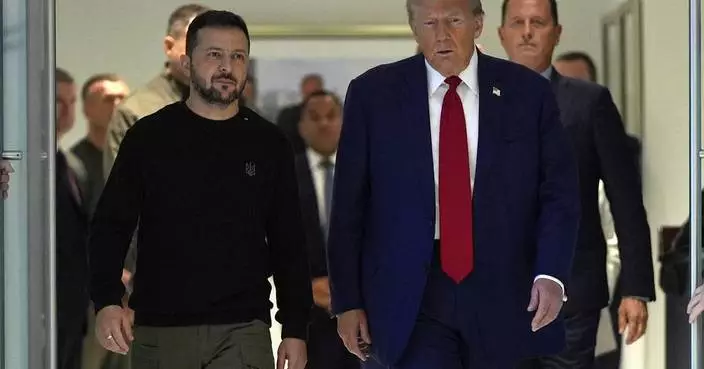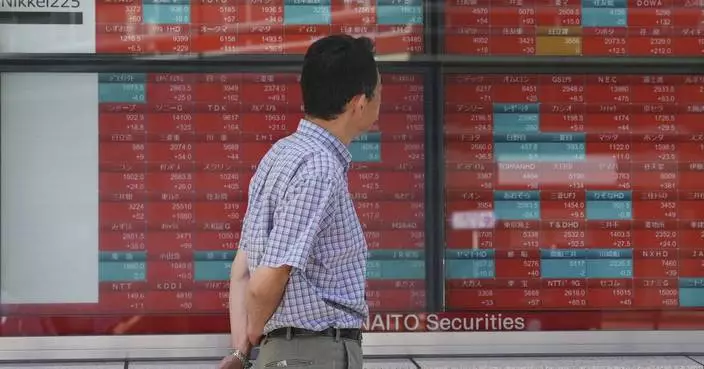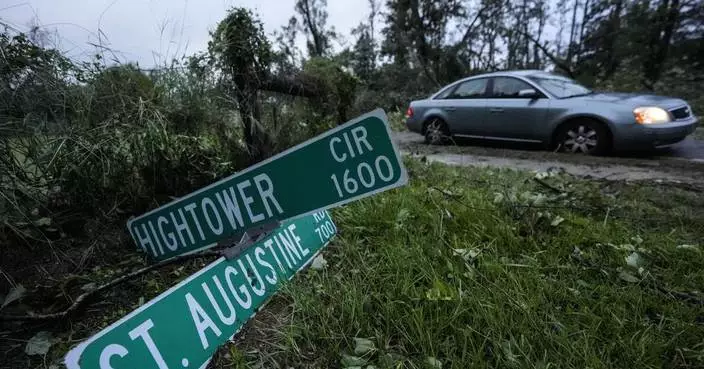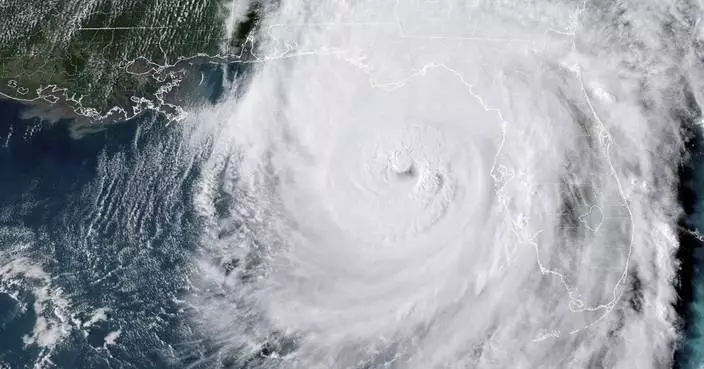NEW YORK (AP) — As the meeting of world leaders kicked off at the United Nations on Sunday, across Manhattan on an elevated park that runs along old rail lines, throngs of people streamed through a “climate science fair” showcasing work on nature, food and the energy transition.
Emerson Collective funds the nonprofits, advocacy organizations and companies at the fair and brought them all to town as counterprogramming to the U.N. General Assembly. The annual convening this year amounted to a shaky demonstration by nation states that they can still work together to solve the world's compounding crises.
Click to Gallery
NEW YORK (AP) — As the meeting of world leaders kicked off at the United Nations on Sunday, across Manhattan on an elevated park that runs along old rail lines, throngs of people streamed through a “climate science fair” showcasing work on nature, food and the energy transition.
People talk near an exhibit by CETI, an organization that seeks to listen to and translate the communication of sperm whales, at the Climate Science Fair, an outdoor exhibit hosted by the Emerson Collective during the annual Climate Week NYC and United Nations General Assembly, on Sunday, Sept. 22, 2024 in New York. (AP Photo/Thalia Beaty)
People look at exhibits at the Climate Science Fair, an outdoor exhibit hosted by the Emerson Collective during the annual Climate Week NYC and United Nations General Assembly on Sunday, Sept. 22, 2024, in New York. (AP Photo/Thalia Beaty)
Tony Hillery, founder and CEO of Harlem Grown, a nonprofit that runs urban farms and works with children, speaks with a young fan at the Climate Science Fair on Sunday, Sept. 22, 2024 in New York. (AP Photo/Thalia Beaty)
People arrive at the Climate Science Fair, an outdoor exhibit hosted by the Emerson Collective during the annual Climate Week NYC and United Nations General Assembly, on Monday, Sept. 23, 2024 in New York. (AP Photo/Peter Morgan)
People look at exhibits at the Climate Science Fair, an outdoor exhibit hosted by the Emerson Collective during the annual Climate Week NYC and United Nations General Assembly on Sunday, Sept. 22, 2024, in New York. (AP Photo/Thalia Beaty)
“The U.N. and so many of those meetings, they are critical, but they are happening behind closed doors. And they’re very future looking, future facing and commitment based,” said Gabe Kleinman, a partner at Emerson Collective, which is billionaire Laurene Powell Jobs' philanthropy and investing organization. Kleinman said that in contrast to the U.N. events, the science fair was open to all and highlighted solutions for climate change that the organization thinks could be impactful right now.
The fair is part of a crush of events every September that unfold on the sidelines of the official high-level meetings, where nonprofits, advocates and fundraisers mingle and lobby world leaders, billionaires and funders — and plan their next steps with each other.
They gather in mostly elite spaces — in marble tiled rooms, under glass chandeliers, with snacks of fresh raspberries and glass bottles of sparkling water — to get their messages to the people with their hands on the levers of power.
It’s a push and pull of influence games and negotiations with very high stakes.
“I’ve been doing this work for 40 years. I have never seen a world where we are faced with so many crises and not just so many crises, but also crises that are increasingly protracted,” said UNICEF deputy executive director of partnerships Kitty van der Heijden.
The number of people who need humanitarian assistance has ballooned from 63 million in 2012 to 367 million, including 183 million children, as of March 2024, UNICEF said.
Van der Heijden said she hopes the private sector and philanthropy will become even more involved in the multilateral system to meet the needs of children. Philanthropic money in particular can be more flexible, longer term and take on more risk than public funding, she said.
But philanthropic dollars won't ever match the resources that governments can leverage.
To that end, billionaire Microsoft co-founder Bill Gates called on nations to fully fund the vaccines alliance GAVI and invest in reducing malnutrition, especially among children at the Bill & Melinda Gates Foundation's annual Goalkeepers event that tracks progress toward global development goals.
In a ceremony on Monday that featured Grammy-winning musician Jon Batiste performing in a gold sequin suit, the foundation honored Brazilian president, Luiz Inácio Lula da Silva, for his work during his first term lifting millions out of poverty and significantly reducing malnutrition among children.
“I think it’s commendable that executives like you create a foundation." said da Silva, addressing Gates while on stage. "But what will effectively solve the problem of extreme poverty is not through a foundation’s donation, which is important, but through public policies.”
To follow the political commitments made by nation states, organizations like the antipoverty nonprofit Oxfam brought in technical experts to New York. They tracked changes word by word over multiple drafts of a pact that countries agreed on coming into a special two day gathering, the “Summit of the Future,” where they recommitted to the Sustainable Development Goals, including gender equality, that were set back in 2015.
Rebecca Shadwick, a policy and advocacy lead for Oxfam International, said one change that civil society groups advocated to get into the final draft was a commitment to “achieve” gender equality rather than to "accelerate the achievement of gender equality.” While civil society groups have no formal role in the negotiations, they see themselves as partners in the development of the goals. Practically, nonprofits play a major role in actually realizing these promises, which are significantly off track.
Funders who prioritize efforts to combat gender-based violence gathered at the Free Future 2024 conference last week, hosted by the Ford Foundation, whose headquarters around the corner from the U.N. are built around a large indoor garden.
They described constant and urgent demands for support from feminist organizations around the world. Abigail Erikson, chief of the UN Trust Fund, said her organization received $1.5 billion in requests for funding this year, while having only $13.5 million to grant out. Her fund is dedicated to addressing violence against women and girls.
“It’s overwhelming," Erikson said, though she thinks of the potential if that demand was funded. “Imagine if we had the money flows for that, the same way that the money is flowing to the anti-rights movement.”
Elsewhere around town, money did flow. Under a soaring arched ceiling held up by stone pillars, the UN’s sexual and reproductive health agency convened ministers to announce $350 million in new funding for family planning and health services. As a part of that pledge, the British hedge fund billionaire Sir Chris Hohn announced a $100 million commitment to UNFPA through the Children’s Investment Fund Foundation, of which he is founder and chair.
Describing contraception and support for women to make their own choices about when and if to have children as a “best buy” in development, Hohn said it was “stupidity” and a lack of empathy keeping governments from fully funding the work of the UN's sexual and reproductive health agency.
Those sentiments — among the panel discussions, keynotes and one-on-one meetings, which start early and extend late — are what civil society groups want world leaders to hear, not just for the future of their groups, but also the people they serve all over the world.
Associated Press writer Eléonore Hughes contributed from Rio de Janeiro.
Associated Press coverage of philanthropy and nonprofits receives support through the AP’s collaboration with The Conversation US, with funding from Lilly Endowment Inc. The AP is solely responsible for this content. For all of AP’s philanthropy coverage, visit https://apnews.com/hub/philanthropy.
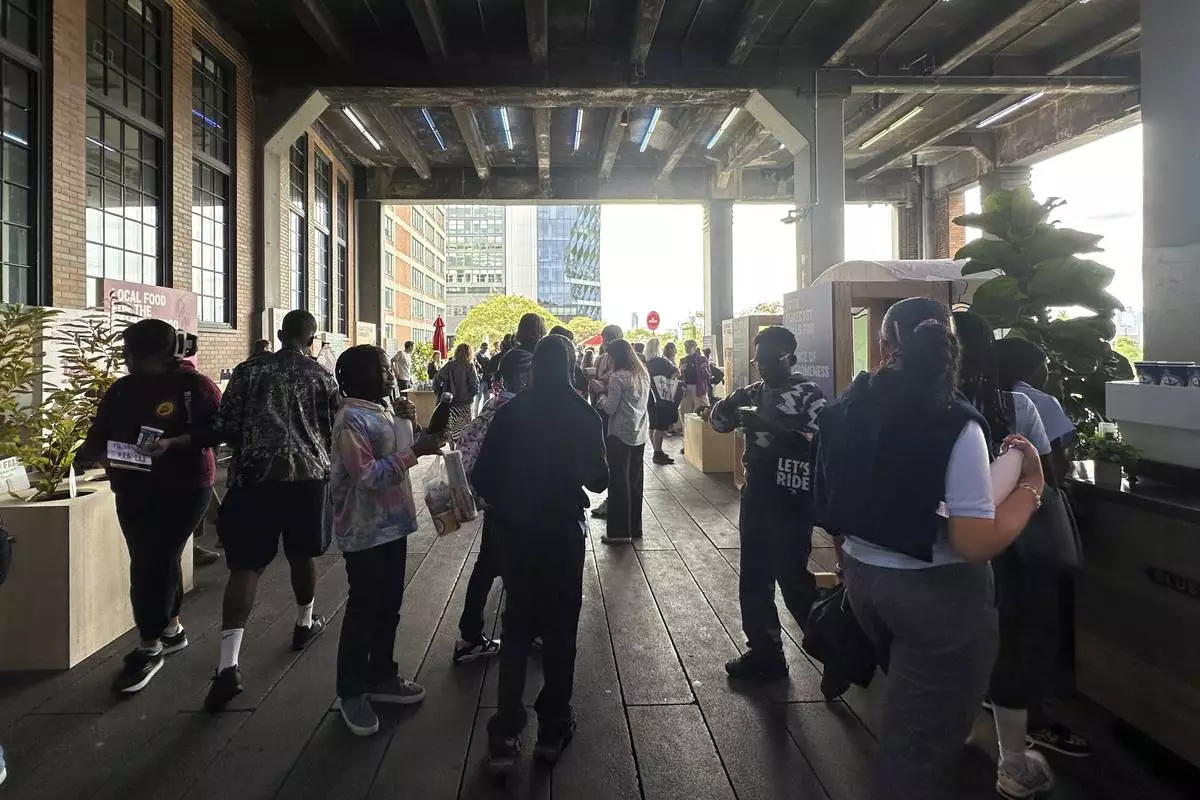
People look at exhibits at the Climate Science Fair, an outdoor exhibit hosted by the Emerson Collective during the annual Climate Week NYC and United Nations General Assembly, on Monday, Sept. 23, 2024 in New York. (AP Photo/Peter Morgan)
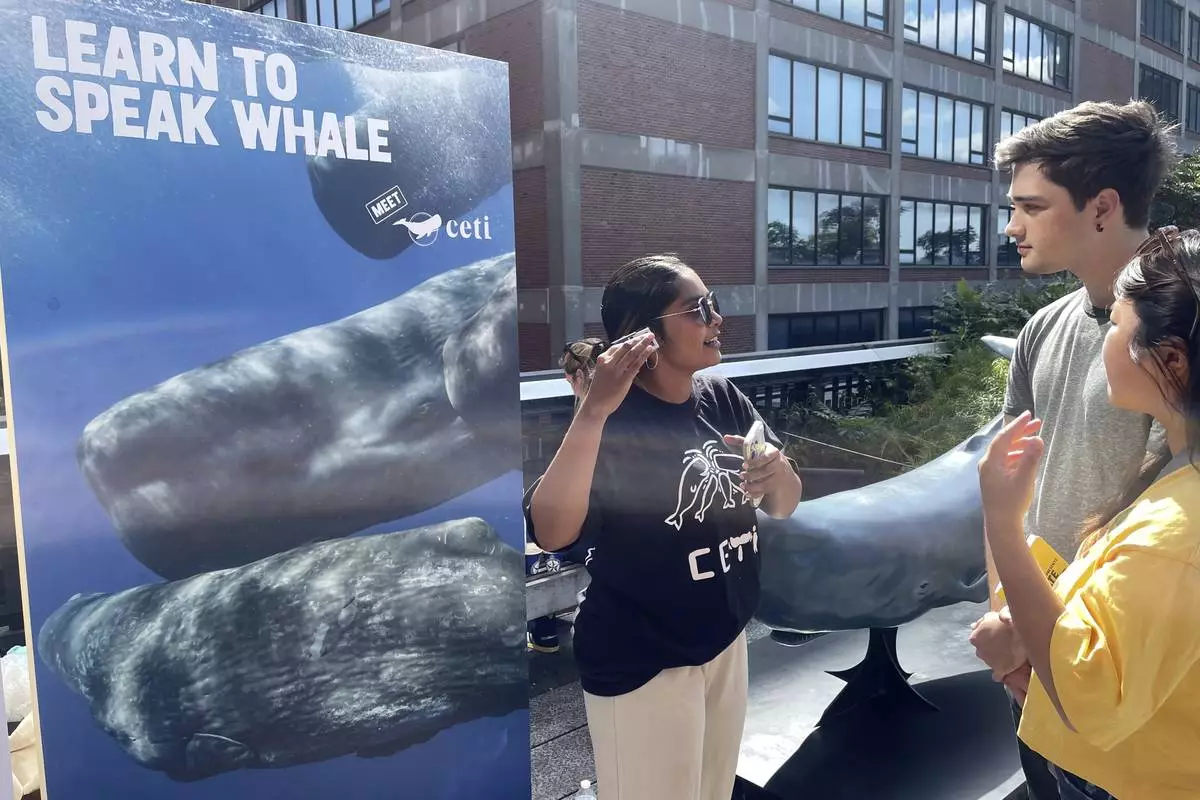
People talk near an exhibit by CETI, an organization that seeks to listen to and translate the communication of sperm whales, at the Climate Science Fair, an outdoor exhibit hosted by the Emerson Collective during the annual Climate Week NYC and United Nations General Assembly, on Sunday, Sept. 22, 2024 in New York. (AP Photo/Thalia Beaty)
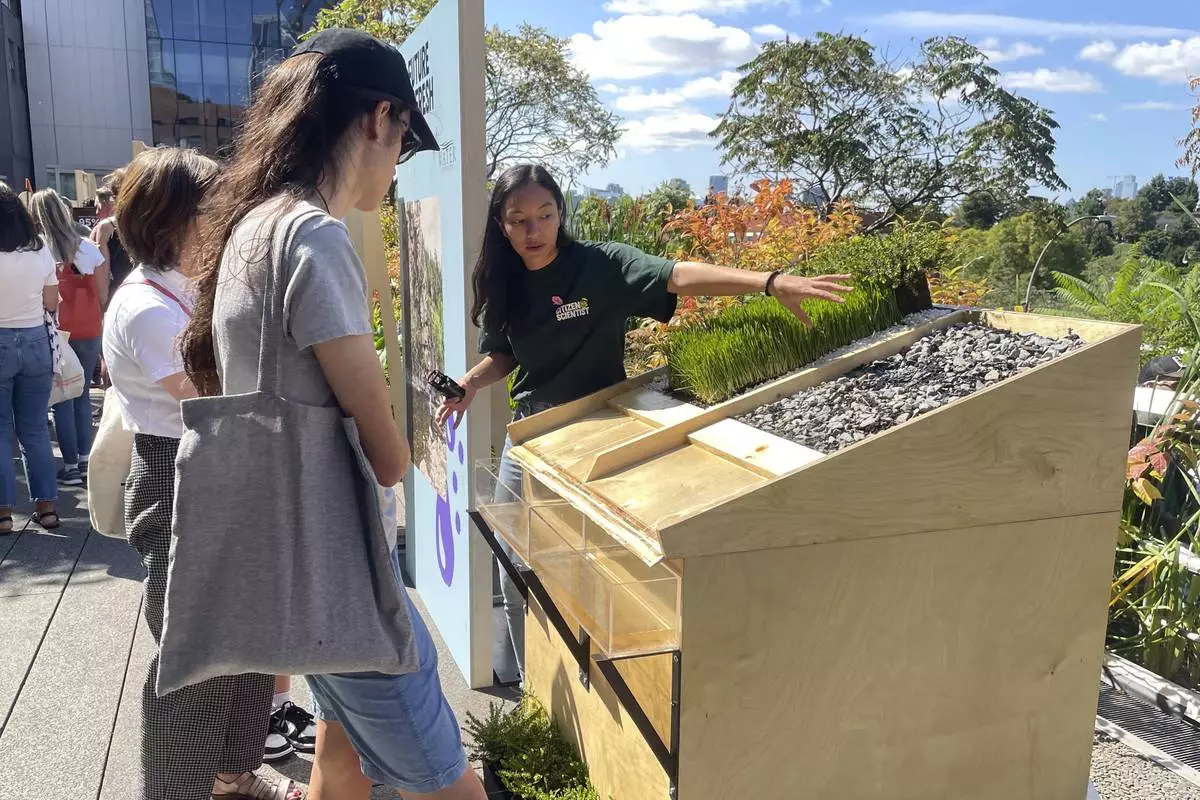
People look at exhibits at the Climate Science Fair, an outdoor exhibit hosted by the Emerson Collective during the annual Climate Week NYC and United Nations General Assembly on Sunday, Sept. 22, 2024, in New York. (AP Photo/Thalia Beaty)
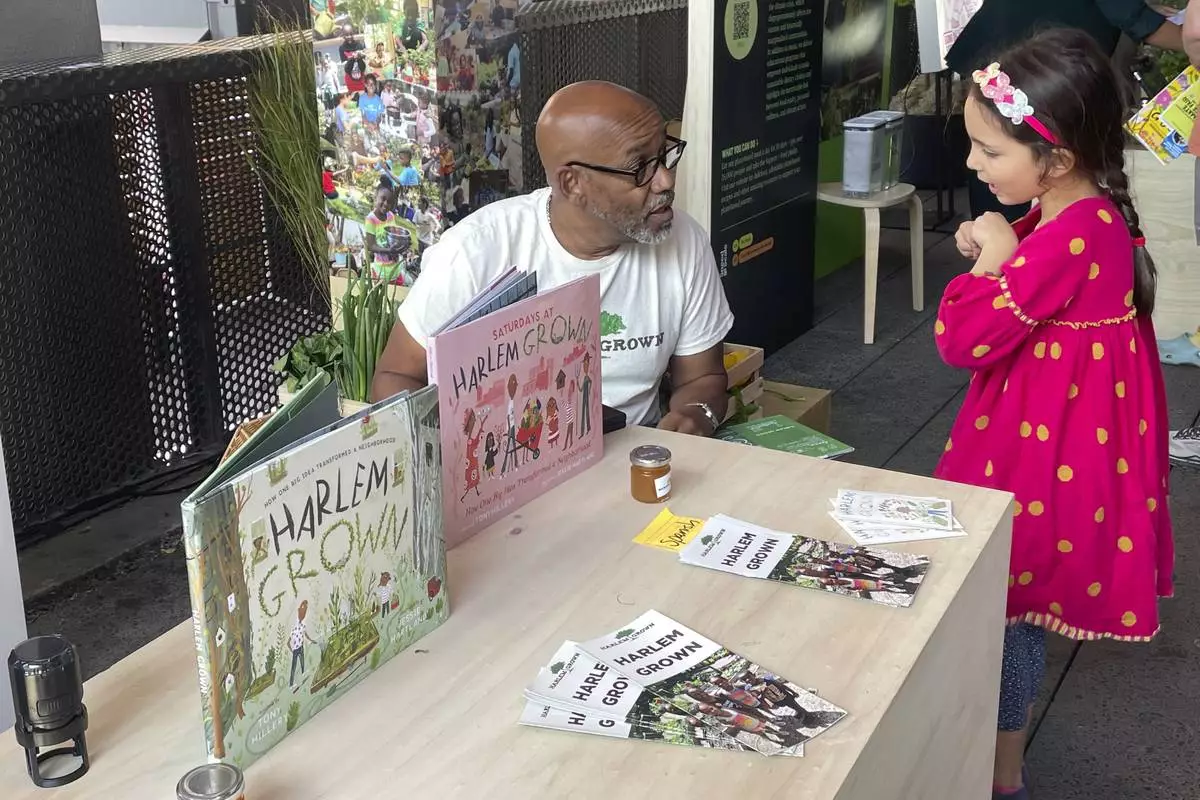
Tony Hillery, founder and CEO of Harlem Grown, a nonprofit that runs urban farms and works with children, speaks with a young fan at the Climate Science Fair on Sunday, Sept. 22, 2024 in New York. (AP Photo/Thalia Beaty)
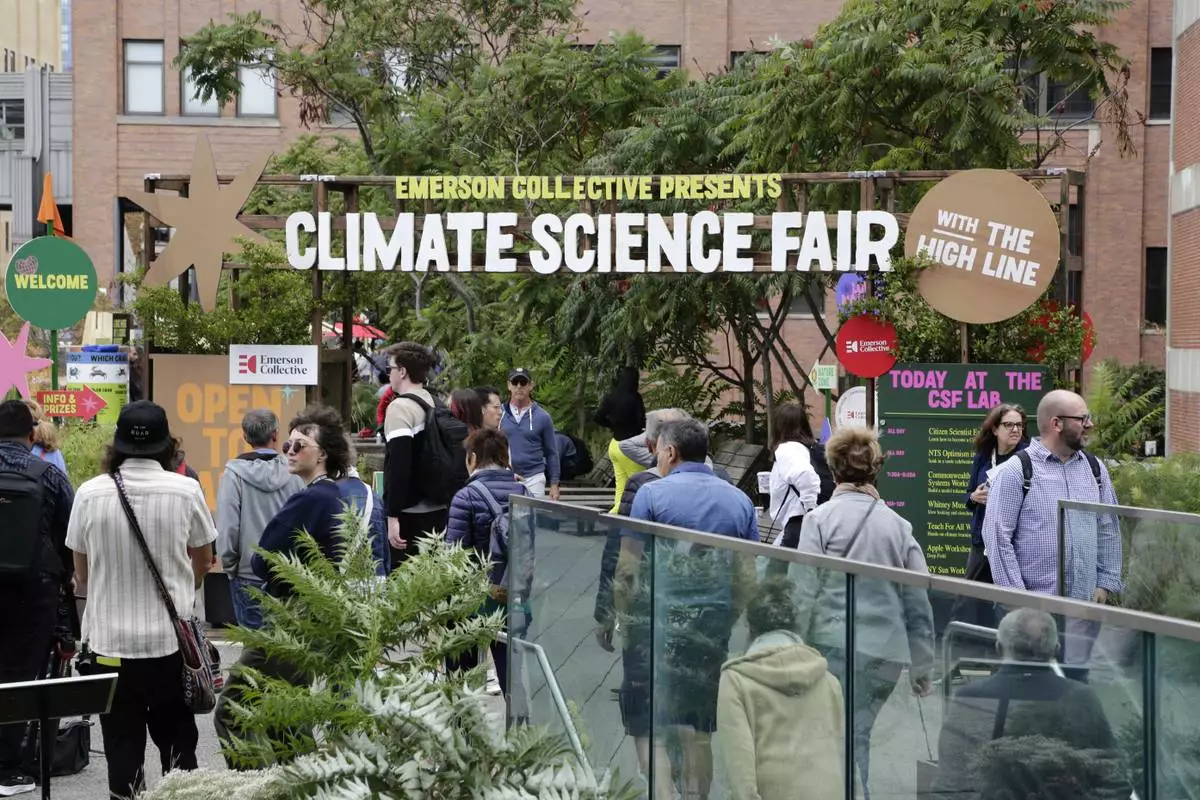
People arrive at the Climate Science Fair, an outdoor exhibit hosted by the Emerson Collective during the annual Climate Week NYC and United Nations General Assembly, on Monday, Sept. 23, 2024 in New York. (AP Photo/Peter Morgan)
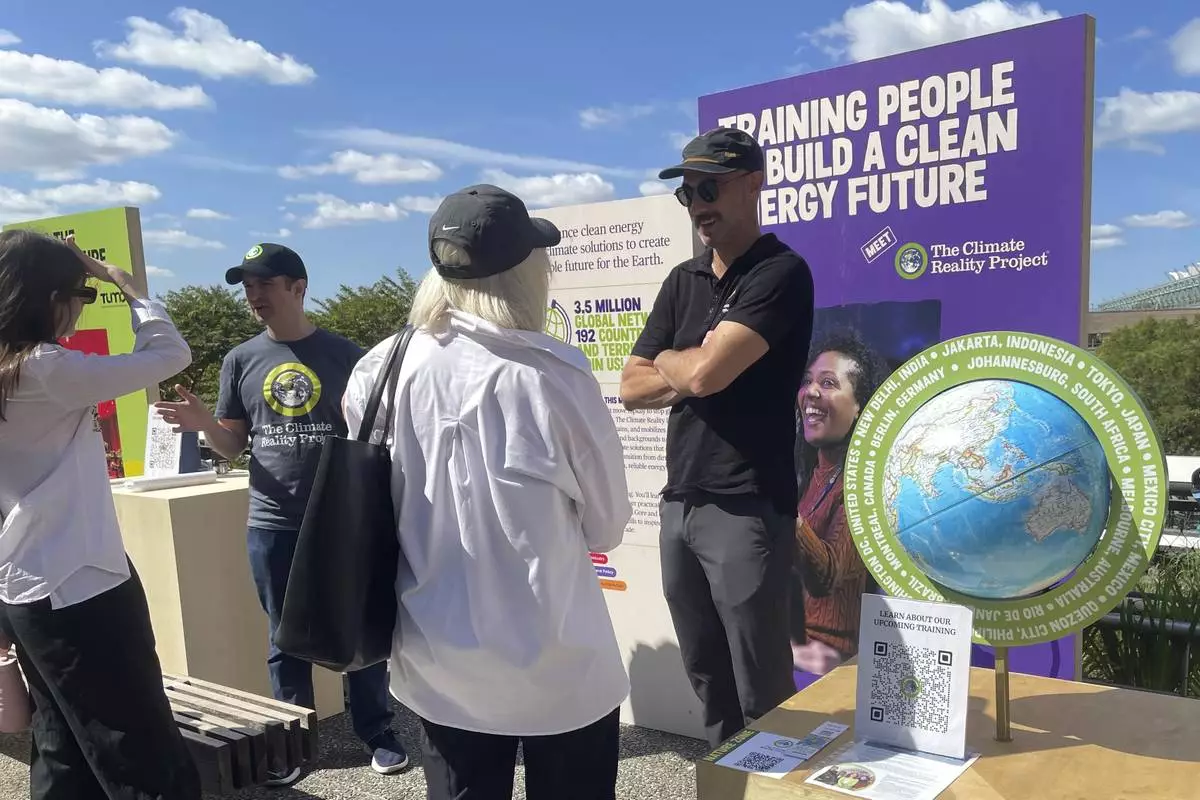
People look at exhibits at the Climate Science Fair, an outdoor exhibit hosted by the Emerson Collective during the annual Climate Week NYC and United Nations General Assembly on Sunday, Sept. 22, 2024, in New York. (AP Photo/Thalia Beaty)
UNITED NATIONS (AP) — His leadership strained by conflicts on two fronts, Israeli Prime Minister Benjamin Netanyahu told world leaders at the United Nations on Friday that his nation will “continue degrading Hezbollah" until achieving its goals along the Lebanon border, further dimming hopes for an internationally backed cease-fire to halt the spiral into an all-out regional war. He said his government would no longer tolerate daily rocket fire from the area.
“Israel has every right to remove this threat and return our citizens to their home safely. And that’s exactly what we’re doing ... we’ll continue degrading Hezbollah until all our objectives are met," Netanyahu said to a gallery that — at least from the crowd noise — appeared replete with his supporters.
“Just imagine if terrorists turned El Paso and San Diego into ghost towns ... How long would the American government tolerate that?" he said, shaking his fist in emphasis. “Yet Israel has been tolerating this intolerable situation for almost a year. Well, I’ve come here today to say: Enough is enough.”
Netanyahu, armed with visual aids as he has been in the past, defended his nation's response to the Oct. 7, 2023, attacks by Hamas on Israel that triggered an Israeli military operation that has devastated the Gaza Strip. He said he traveled to the United Nations to refute the untruths he had heard from other leaders on the same rostrum earlier in the week.
“I didn’t intend to come here this year. My country is at war fighting for its life," Netanyahu said. "But after I heard the lies and slanders leveled at my country by many of the speakers at this podium, I decided to come here and set the record straight.”
He insisted that Israel wanted peace but said of Iran: “If you strike us, we will strike you.” He once again blamed Iran for being behind many of the problems in the region.
“For too long, the world has appeased Iran," Netanyahu said. “That appeasement must end.”
As he spoke, the seats in the Iran delegation sat empty. Outside, protesters against Netanyahu and Israel's policies demonstrated behind police barricades.
Israel’s campaign in Gaza has killed more than 41,500 Palestinians and wounded more than 96,000 others, according to the latest figures released Thursday by the Health Ministry. The ministry, part of Gaza’s Hamas government, doesn’t differentiate between civilians and combatants, but more than half the dead have been women and children, including about 1,300 children under the age of 2.
Israel has maintained its military operations are justified and are necessary to defend itself.
“This war can come to an end now. All that has to happen is for Hamas to surrender, lay down its arms and release all the hostages," Netanyahu said. "But if they don’t – if they don’t – we will fight until we achieve total victory. Total victory. There is no substitute for it. “
He said Israeli forces have destroyed “90%” of Hamas’ rockets and killed or captured half of its forces. But he insisted nonetheless that he was pursuing peace. “Israel has made peace and will make peace again,” he said.
In recent days, Israel has turned its attention to the border with Lebanon, where it is has stepped up strikes targeting Hezbollah but has inflicted civilian casualties as well. Hezbollah began firing rockets into Israel almost immediately after the Hamas attack, saying it was a show of support for the Palestinians. That triggered Israeli counterfire and the two sides have traded fire almost daily for the 11 months since, driving tens of thousands of people from their homes on both sides of the border.
Israel vows to drive Hezbollah away from the border to allow its citizens to return safely to their homes. Hezbollah says it won’t stop firing rockets until the Gaza war ends. Late Wednesday, the United States, France and other allies jointly called for an “immediate” 21-day cease-fire to allow for negotiations as fears grow that this week’s escalation could spiral into an all-out war. Hezbollah hasn’t officially responded to the ceasefire proposal.
The United Nations says over 90,000 people have been displaced by five days of Israeli strikes on Lebanon, bringing the total to 200,000 people who have been displaced in Lebanon since the cross-border exchanges began.
Netanyahu also made a lengthy appeal for Israeli relations with Saudi Arabia — but did it without mentioning what’s blocking any action: Saudi Arabia’s demand for an independent Palestinian state.
As Netanyahu took the stage Friday morning, there was enough ruckus in the audience that the presiding diplomat had to shout, “Order, please.”
The two speakers who preceded Netanyahu on Friday each made a point of calling out Israel for its actions. “Mr. Netanyahu, stop this war now,” Slovenian Prime Minister Robert Golob said as he closed his remarks, pounding the podium. And Pakistani Prime Minister Shehbaz Sharif, speaking just before the Israeli leader, declared of Gaza: “This is not just a conflict. This is systematic slaughter of innocent people of Palestine." He thumped the rostrum to audible applause.
And after the Israeli leader left the stage, the next speaker, Prime Minister Mia Mottley of Barbados, started speaking but then paused for noises in the gallery, saying, “We can wait.” She did so for about 20 seconds before she continued.
It wasn't just Friday, either. On Thursday, the leader of the Palestinian Authority and a top Lebanese official both made their cases to fellow leaders — cases that included harsh words for Israel as well. Mahmoud Abbas' first words to the General Assembly were a sentence repeated three times in reference to Gaza: “We will not leave. We will not leave. We will not leave.” He accused Israel of destroying Gaza and making it unlivable. And Abdallah Bouhabib, Lebanon's foreign minister, decried Israel's “systematic destruction of Lebanese border villages.”
“The crisis in Lebanon threatens the entire Middle East,” Bouhabib said. “We wish today to reiterate our call for a cease-fire on all fronts.”
See more of AP’s coverage of the U.N. General Assembly at https://apnews.com/hub/united-nations
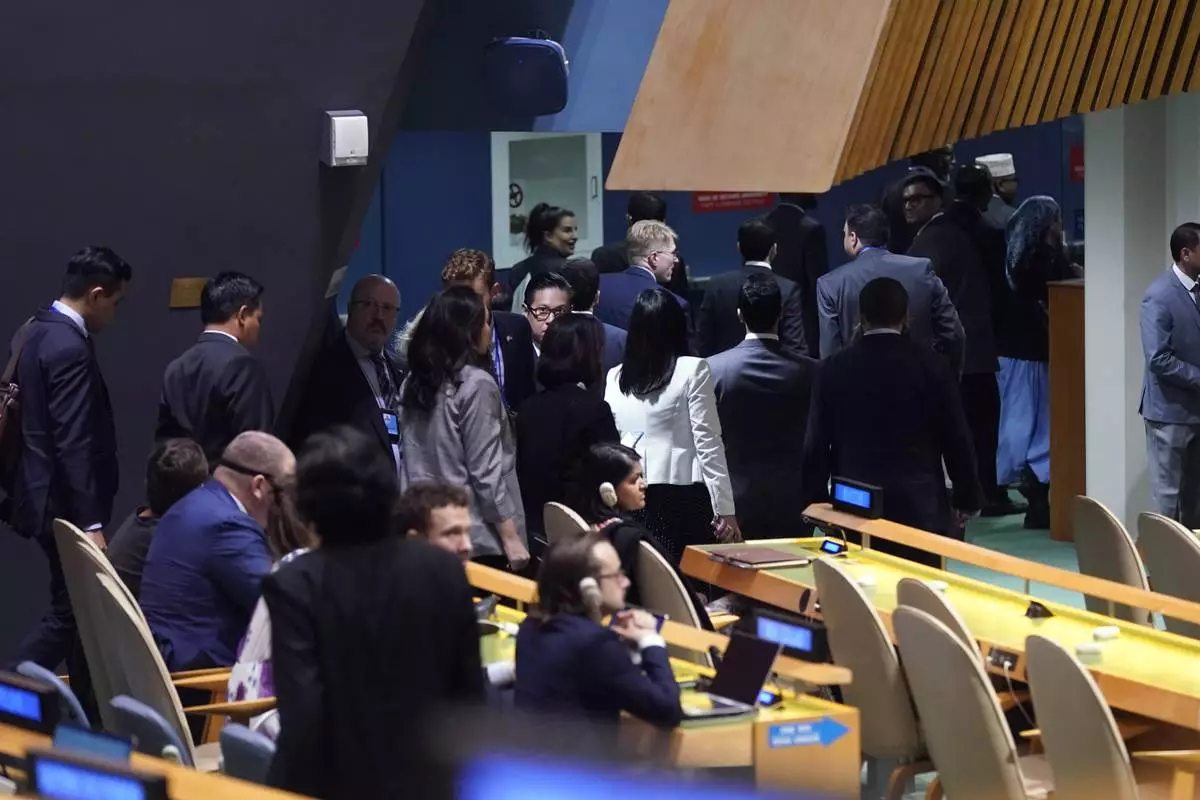
Delegates leave the General Assembly as Israel Prime Minister Benjamin Netanyahu addresses the 79th session of the United Nations General Assembly, Friday, Sept. 27, 2024. (AP Photo/Richard Drew)
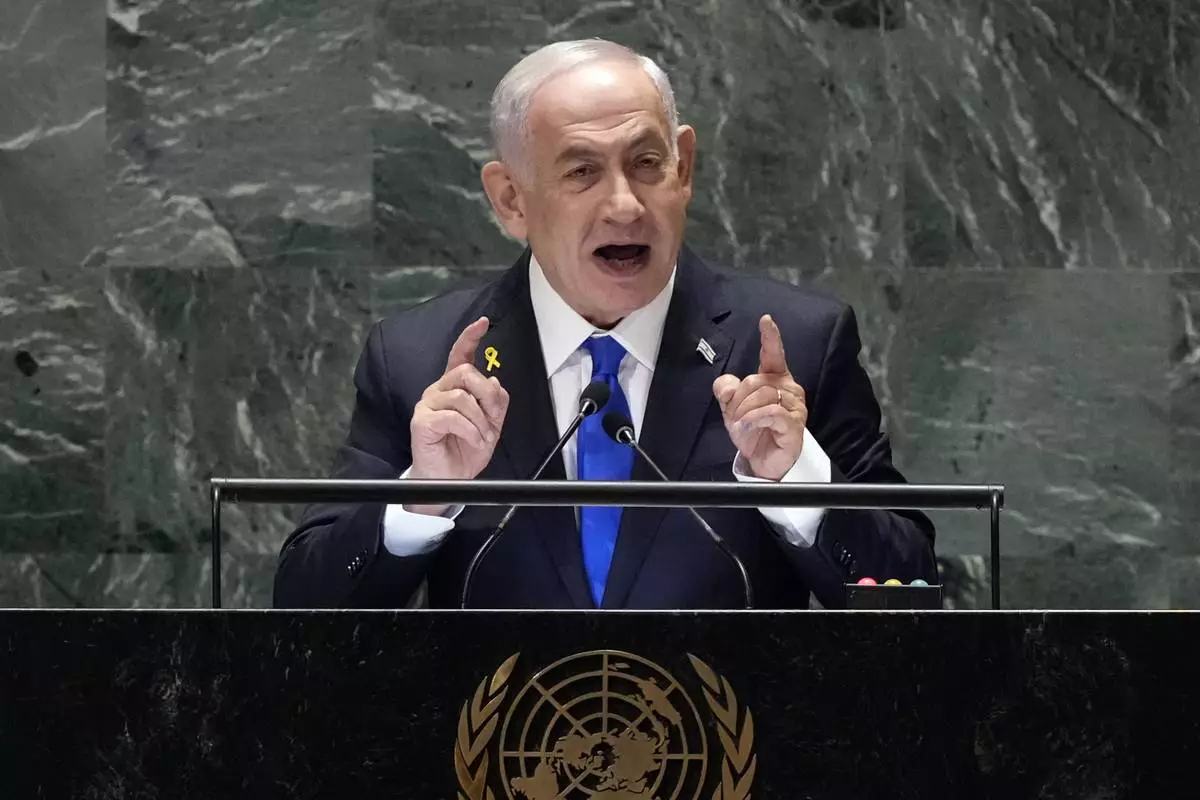
Israel Prime Minister Benjamin Netanyahu addresses the 79th session of the United Nations General Assembly, Friday, Sept. 27, 2024. (AP Photo/Richard Drew)
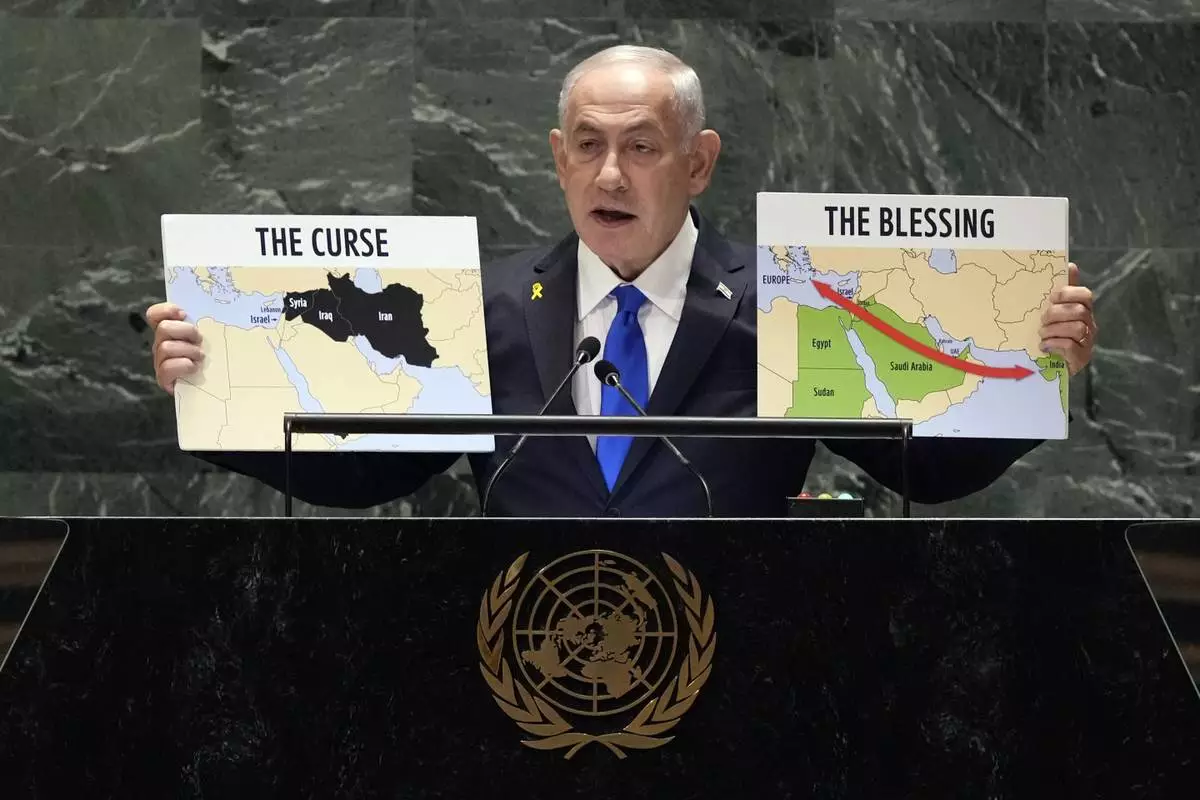
Israel Prime Minister Benjamin Netanyahu addresses the 79th session of the United Nations General Assembly, Friday, Sept. 27, 2024. (AP Photo/Richard Drew)
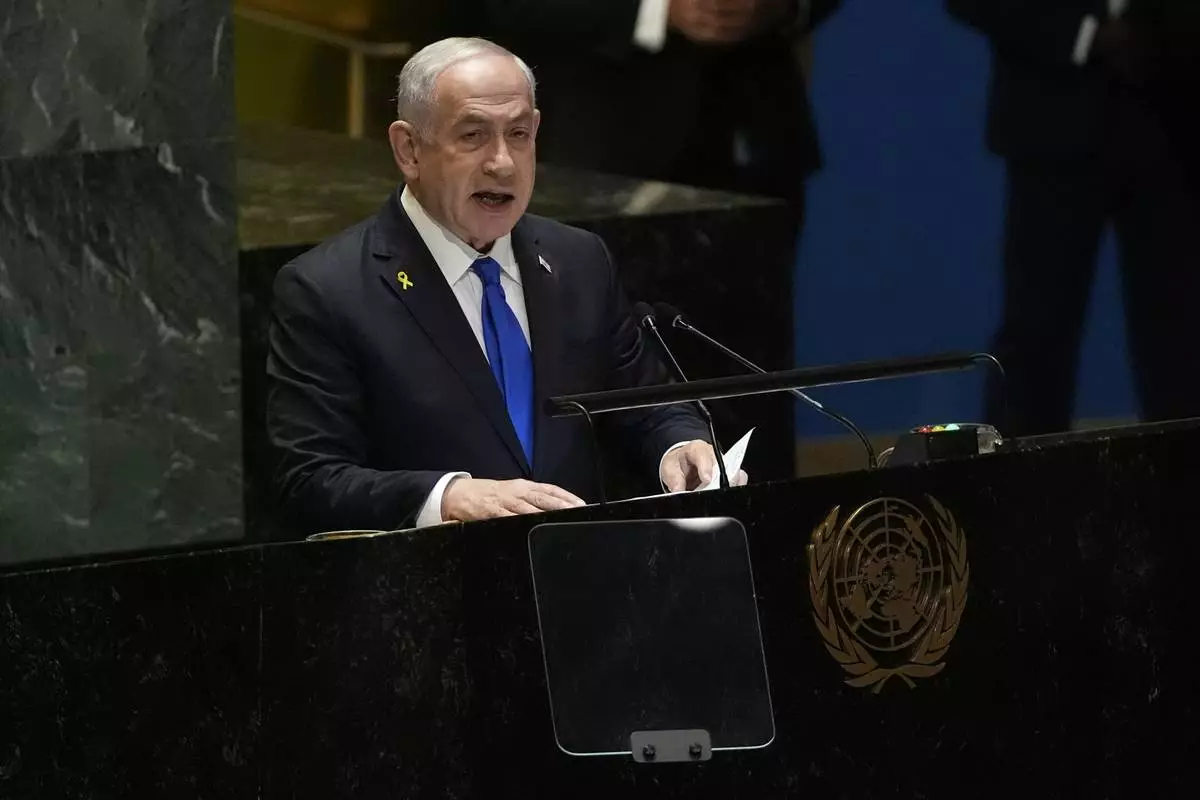
Prime Minister of Israel Benjamin Netanyahu addresses the 79th session of the United Nations General Assembly, Friday, Sept. 27, 2024. (AP Photo/Pamela Smith)
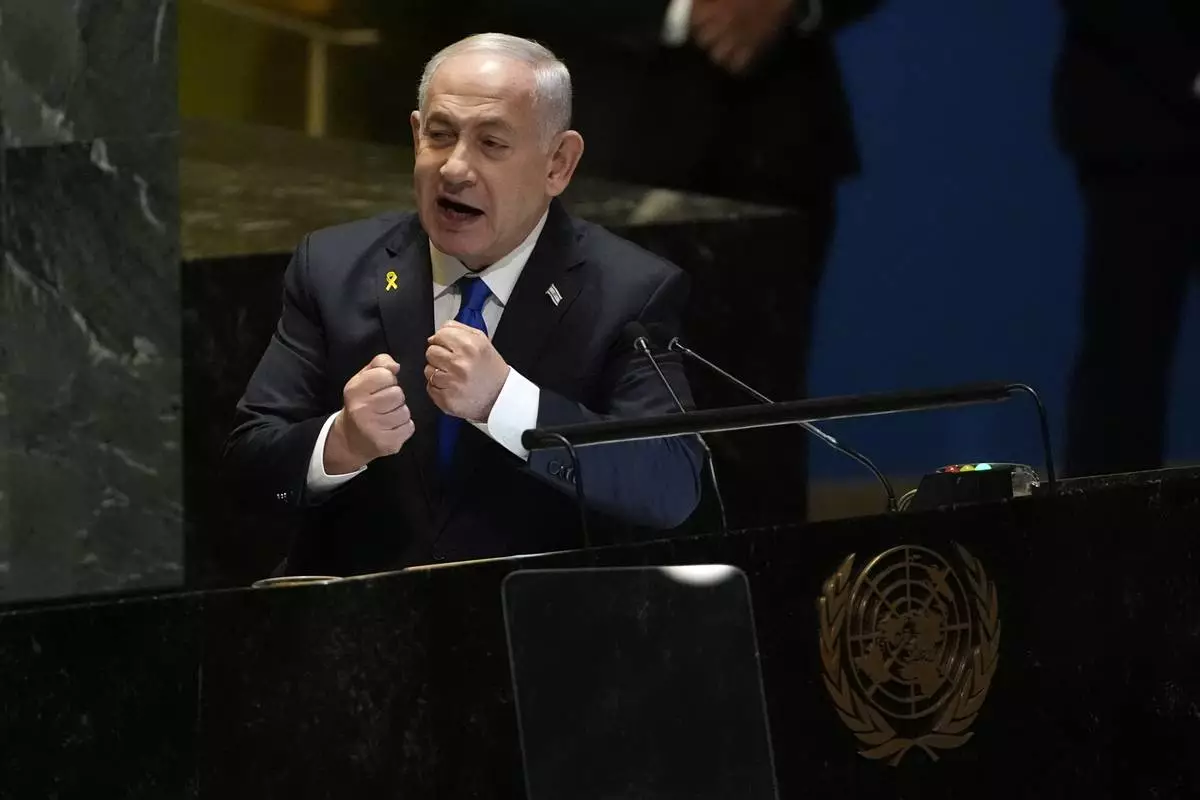
Prime Minister of Israel Benjamin Netanyahu addresses the 79th session of the United Nations General Assembly, Friday, Sept. 27, 2024. (AP Photo/Pamela Smith)








